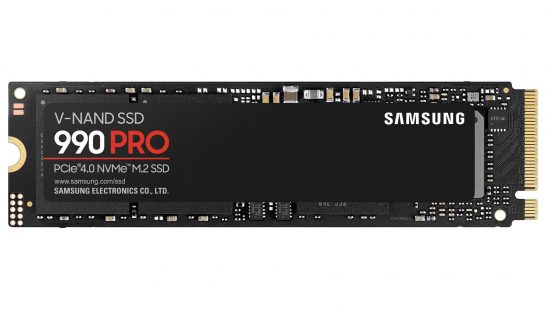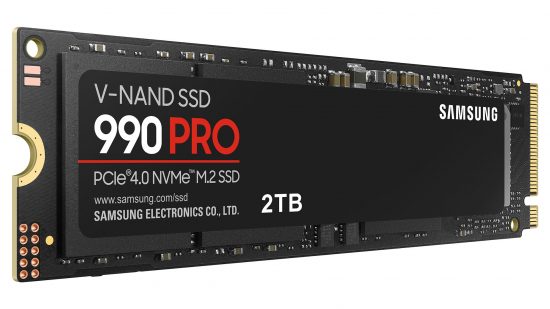Our Verdict
79%Very fast in sequential read and write tests, but it’s too expensive to be competitive.
With an enviable reputation in the SSD market, Samsung is another manufacturer to have snuck out one more PCIe 4 SSD, just when we thought everyone was moving to PCIe 5. Like the WD Black SN850X, Samsung is vying for both PC and console markets with the 990 Pro, which is available with or without an RGB-enabled heatsink.
It’s the heatsink-less 2TB version we’re reviewing here, and while the WD Black SN850X has seen a substantial price cut and costs around $200 for this capacity, the 990 Pro still hovers around the $280 mark.
That’s a sizeable difference, and even the 1TB model’s $154 price tag dwarfs the sub-$120 price tag of the similar WD model. Value isn’t the 990 Pro’s strong point, then, but maybe speed can tempt people to part with their cash instead.
The 990 Pro uses an in-house Samsung controller, codenamed Pascal, along with 2GB of LPDDR4 memory as a cache for its V-NAND TLC memory. Like the WD Black SN850X, it also sports a software feature called TurboWrite 2, which acts as a buffer to boost performance.
This buffer sits at 10GB on the 2TB model we tested but can be enlarged to up to 226GB using Samsung’s software. Speaking of capacities, while WD already has a 4TB version of its Black SN850X available, Samsung has said a 4TB model of the 990 Pro won’t arrive until 2023, meaning 2TB is the current limit for this drive.
Specifications are similar to the WD SSD, though, with both drives offering an endurance rating of 1,200TBW, a five-year warranty, a stated read speed of 7,300MB/s, and a claimed write speed of 6,600MB/s.
Samsung 990 Pro performance
While the WD Black SN850X failed to top 7,000MB/s, no matter which M.2 port we used on our test motherboard, if we hooked up the 990 Pro to the CPU-linked port on our X570 motherboard, we managed to coax 7,198MB/s out of it on the CrystalDiskMark sequential read speed test, and 6,754MB/s in the write test. These are blisteringly quick sequential speeds and noticeably quicker than those of the WD SSD.

The Samsung was also slightly quicker in the random 4K 32-queue-depth 16-thread test in CrystalDiskMark, peaking at a read speed of 3,105MB/s vs 2,840MB/s for the WD drive, and also recording a slightly higher write speed. It also managed 520MB/sec in the PCMark 10 full storage benchmark average speed test, compared to 463MB/sec for the WD drive.
However, elsewhere it was the WD Black SN850X that sat out in front, despite its much lower price. The WD drive beat the Samsung 990 Pro in both read and write speeds in the random 4K single-queue-depth single-thread tests and was much faster in the 3DMark game load time performance.
In Battlefield V it managed a 1,154MB/s load time vs 1,035MB/s for the Samsung drive, while in Call of Duty: Black Ops it hit 965MB/s vs 739MB/s for the Samsung drive, and the WD drive’s access times were far lower too. The 990 Pro also needs a heatsink to operate at full speed, quickly hitting 75°C in our stress test without one.
Samsung 990 Pro pros and cons
Pros
- Huge sequential speeds
- Good 4K random speeds
- Decent warranty and endurance rating
Cons
- Very expensive
- Slower than the competition in some tests
- No 4TB model available yet
Samsung 990 Pro specs
The Samsung 990 Pro specs list is:
| Max capacity | 2TB |
| Formatted capacity | 1.81GB |
| Controller | Samsung in-house |
| Endurance rating | 1,200TBW (2TB) |
| Warranty | Five years |
| NAND | TLC |
Samsung 990 Pro price
Price: Expect to pay $280 USD / £280 GBP (2TB drive)
Samsung 990 Pro review conclusion
We’ve dished out plenty of awards to Samsung SSDs in recent years, but feel the company has dropped the ball with this one. It’s incredibly fast in theory, with the highest sequential speeds we’ve ever seen, but this doesn’t translate into chart-topping performance across the board, and it’s certainly not fast enough all round to justify its hefty price. It’s a seriously fast SSD, especially for those shifting lots of data around regularly, but the WD Black SN850X isn’t much slower and costs significantly less money.
Looking for more storage upgrade options? Check out our guide to the best gaming SSD where we recommend options for every budget, with 1TB drives starting from just $55.
